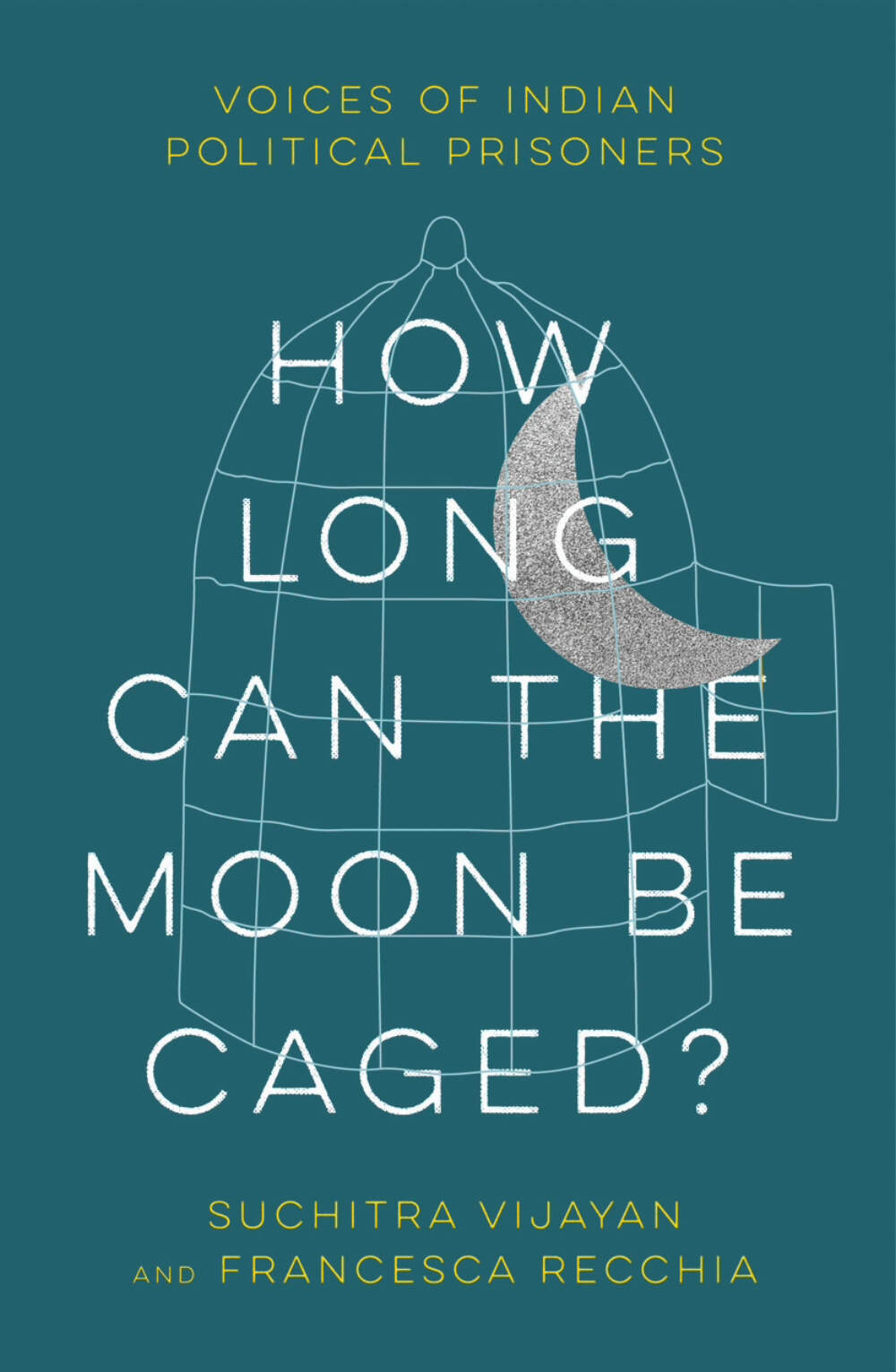Advertisement
'How Long Can the Moon be Caged?' documents increasing suppression of free speech in India
Resume
Host Deepa Fernandes speaks with Suchitra Vijayan, co-author of the new book "How Long Can the Moon be Caged?," which documents how people who speak in favor of Muslims and minority communities have increasingly been arrested and imprisoned by the Indian government.

Book excerpt: 'How Long Can the Moon be Caged?'
By Suchitra Vijayan and Francesca Recchia
A Dalit activist we spoke to said that most people do not encounter the state the way Dalits, Adivasis and Muslims do. She told us: ‘The state has always had a boot on our necks.’ Forget living; imagine what it takes to survive this. The boot is always pressed against minorities’ necks, making it hard to breathe, demanding that they beg for dignity every day. She added: ‘[For us] it doesn’t matter who is in power; oppression is the only thing that hasn’t changed’.
Like Vilas Ghogre and other poets and revolutionary bards who have used poetry as an anti-caste tool, KKM – an artists’ collective set up in the wake of the 2002 Gujarat pogrom – follows this tradition.
After the Ramabai Nagar’s firing, the Khairlanji massacre became another critical moment in Dalit political mobilisation. It took months for the news to spread and none of the mainstream media reported on the massacre. Dalit organisations mobilised, protested, filed petitions and, by the end of the year, photographs of the victims’ bodies were pasted on the walls of Dalit bastis. The state quickly swung into action and police cover-ups and bureaucratic mishandling made justice impossible. Anupama Rao, in the aftermath of the massacre, pointed to the state’s fear of the ‘Dalit rage’ as ‘for the state machinery ... the violence of Khairlanji was quickly substituted by the threat of Dalit counterviolence’.28 The state saw any form of Dalit challenge to institutionalised discrimination and resistance against violence or indignity as a source of concern. These acts were quickly labelled as counterviolence to be crushed immediately.
KKM lead singer Sheetal Sathe said that they ‘could not fathom the brutality of that massacre’.29 Deepak Dhengle said that the gruesome event and the anger that followed transformed KKM’s songs, politics and life. After Khairlanji, the atrocities just kept increasing and inspired their songs ‘De Dalita Thoka’ (Fight back Dalits!) and ‘Dalits, Hala Bol’ (Dalits, get ready): ‘This democracy is not for you; / This judiciary is not for you. / This judiciary is not for you; / this governance is not for you.’
KKM asked simple yet powerful questions through their songs and performances. ‘If we can’t speak our minds, then what is the use of this democracy? No one wants to talk about our rights.’ As their popularity grew, the Congress-led Maharashtra state government published in local newspapers a ‘hit list’ of 37 organisations and activists, including KKM, labelling them as Naxalites.
The police put the group under surveillance, started turning up at their events and homes while their book stalls were raided and their books seized. In 2011, Deepak Dhengle and Siddharth Bhosle were arrested under terror laws and Sheetal Sathe, Sagar Gorkhe, Ramesh Gaichor and Sachin Mali were forced underground after threats from the police. In 2013, they finally re-emerged and gave themselves up to the state after Dhengle and Bhosle were released on bail. Sathe (who was pregnant), Mali, Gorkhe and Gaichor were immediately imprisoned and their bail rejected twice. Sathe was granted bail in late 2013 on humanitarian grounds when she was almost eight-and-a-half months into her pregnancy, while the other three languished in jail for four more years until they were finally released in 2017.
Dhengle, in custody, was tortured, beaten, stripped, his hands and legs tied with a rope and hung from the ceiling. In an interview, he joked that the judge who granted bail to the Bollywood superstar Salman Khan after a deadly hit-and-run conviction was the same judge who denied bail to all the KKM members for over two years, adding: ‘No one knows how long this case will drag on.’ Between 2011 and 2015, the state couldn’t produce a single witness against Dhengle, who asked: ‘They label us Naxalites if we talk about farmer suicide and malnourishment ... We talk about Dalit issues and that of the backward classes. So why do they have to arrest us for this?’
Why did the state go after a cultural protest group? When songs and street play are weapons and artists become terrorists, what does it say about the state? What is the state hiding? Who is it silencing?
As a Dalit activist we spoke to put it:
They have always come for us first. They have killed our people ... This is what I mean: it seems unbelievable when they come for intellectuals, writers, lawyers and thinkers now. But what is unbelievable in your world has always been our everyday reality. The state always comes for us and there is always a noose connected to us that can be tightened any time.
Dalit social activist and editor of Vidrohi, Sudhir Dhawale was arrested in 2011 for his alleged links with the Maoists. After three years in prison, he was acquitted of all charges. On his release, he said:
Dissenting voices are stifled. We rarely see the oppressed caste fight back. The sustained agitation we saw post-Khairlanji [against caste atrocities] is no longer a common sight. Many of us who participated in protest rallies then have been booked in cases. We were labeled as ‘Naxals.’
The state’s need to silence the Naxal threat and the Dalit rage are inextricably linked. The Indian state has always resorted to illegal measures to deal with the Naxalite threat, including extrajudicial executions, torture and forced disappearances.32 Most victims of these police abuses are labourers and peasants from Adivasi and Dalit communities.
Often singled out as Naxalite sympathisers, attacks on rural activists and labourers are sanctioned as part of a campaign to fight Naxalite terrorism. In India’s new national security state, police officers possess absolute and unfettered powers over life and death. Senior police officers with a record of killing Adivasi and peasants regularly receive promotions, cash rewards and favourable postings. The system that has institutionalised lawlessness also rewards exceptional brutality. Long before KKM was implicated in the Bhima Koregaon violence, they were already hounded.
Justice Abhay Thipsay of the Bombay High Court, granting bail to Deepak Dhengle, held the rights to freedom of speech, assemble peacefully and form associations in primacy over the UAPA: ‘Speaking about corruption, social inequality, exploitation of the poor, etc. and desiring that a better society should come in existence is not banned in our country. Claiming that these wrongs exist in our society cannot be banned and made punishable.
This act of gathering, protesting and even of speaking about peace would be penalised very soon. The worst was yet to come.
From "How Long Can the Moon Be Caged? Voices of Indian Political Prisoners" by Suchitra Vijayan and Francesca Recchia, published by Pluto Press, Copyright © Suchitra Vijayan and Francesca Recchia 2023
This segment aired on November 29, 2023.